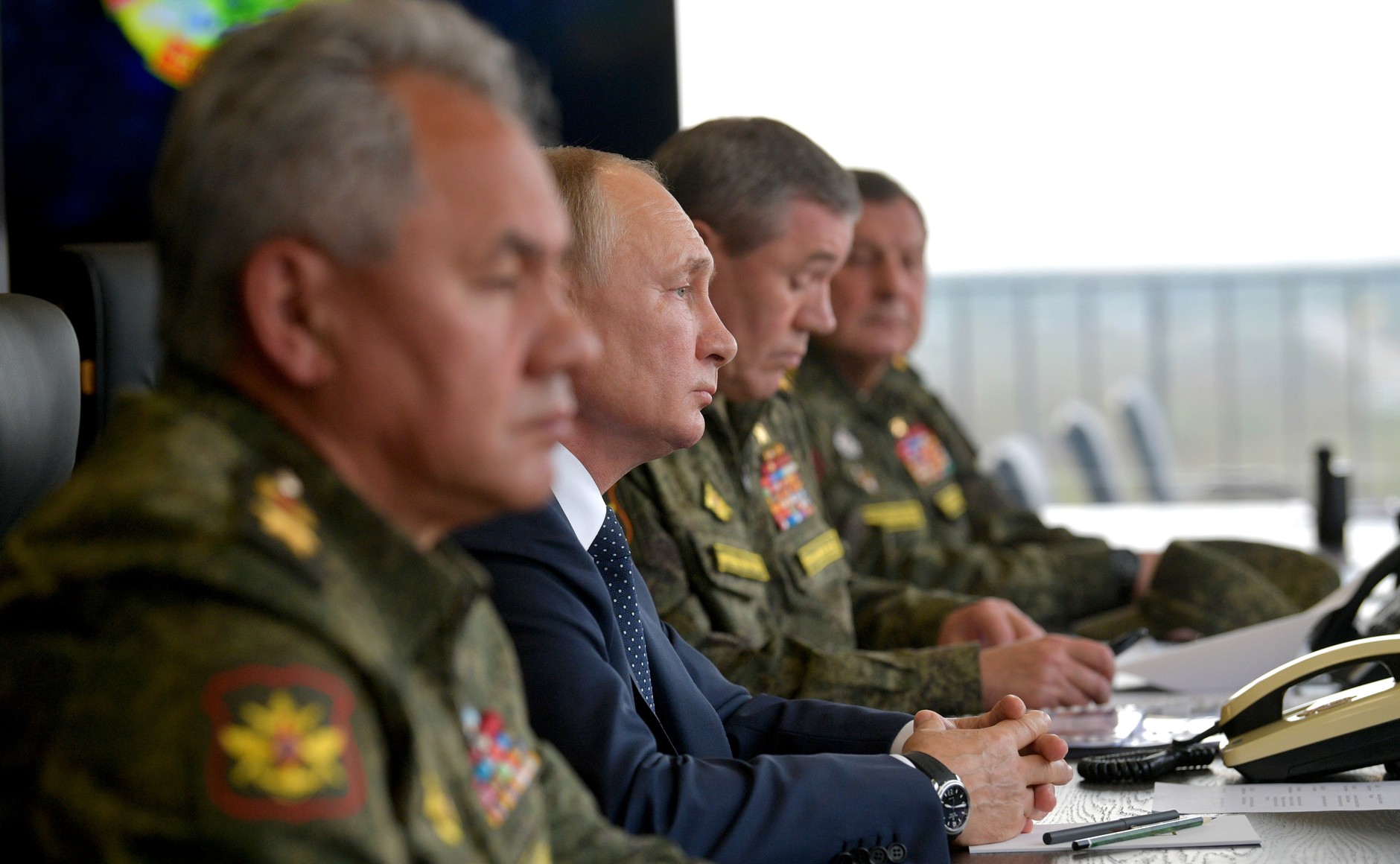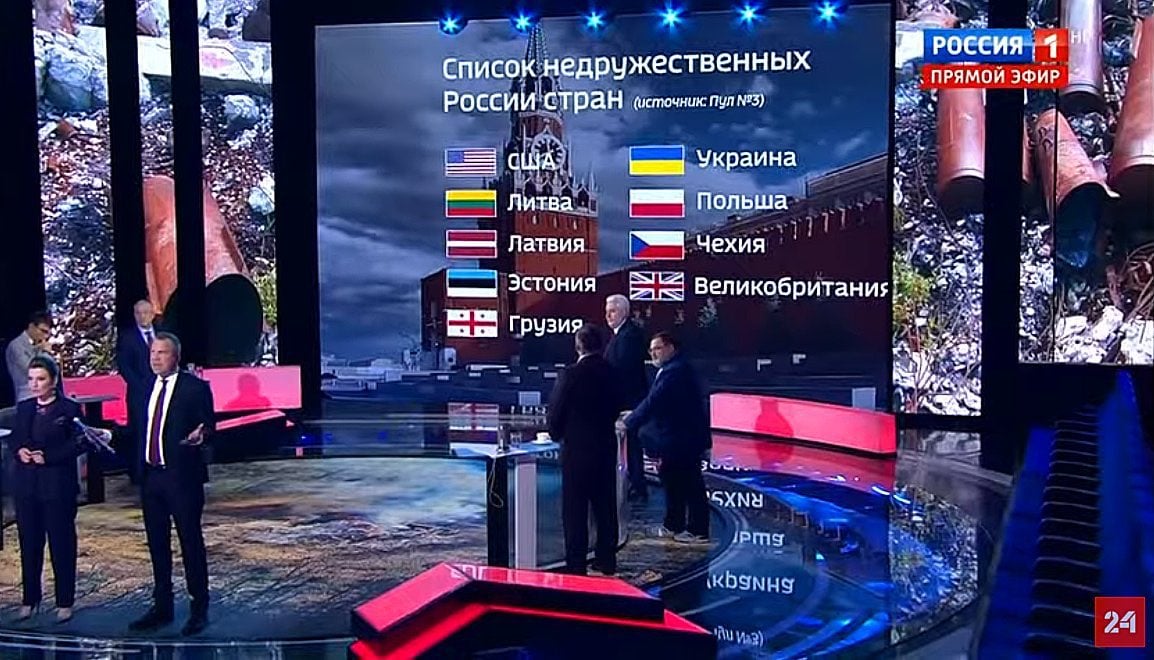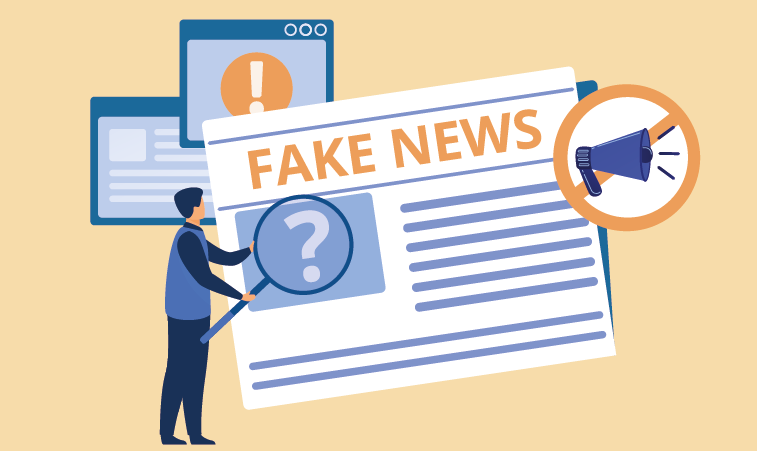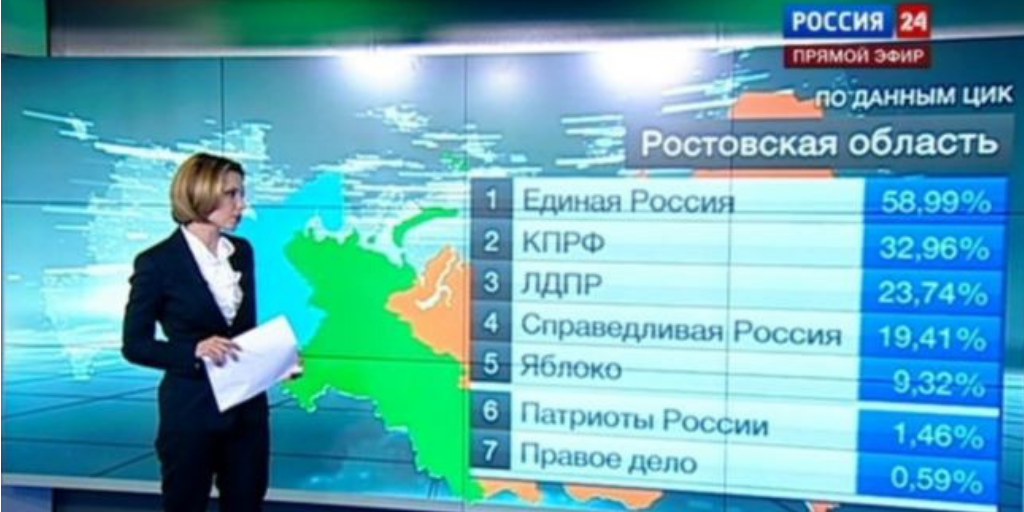"Russia is not facing a military threat, but the 'threat of democracy.' Free nations based on universal rights, democratic principles, and common values. All of which is in direct conflict with the Russian world and its authoritarian rule. It is this -- or the possibility that the Russians will want the same -- that threatens the Russian elite."
Russia is waging hybrid war in the cognitive sphere to confuse and manipulate. It tries to impose its will on us using military force, threats, energy, migration, corruption, and, not least, disinformation. It seeks to create a virtual reality that motivates nations to make decisions that serve Russia.
The ambiguity that arises at the interface between threats of military escalation and the hope of a peaceful solution is exploited to complicate our decision-making processes. Disinformation contributes to the difficulty of both political and military response.
The list of Russian disinformation is long. Very long. While nearly 40% of all the cases in the EUvsDisinfo database is about Ukraine, very many are about NATO. The biggest disinformation of all horrendous claims is the allegation that NATO threatens Russian security. The fact that Russia is making the claim does, however, not make it into a truth. On the contrary, a nation that uses information as a weapon can also lie about the threat.
The ultimate lie
The realities undermine the claim.
Facts 1. NATO is not an aggressor.
It is the defensive alliance of 30 democratic nations. Any decision on military action requires consensus. Where the alliance is arguing for a common strategy to ensure collective defence, it is impossible to imagine that the countries will consider attacking a nuclear power.
Facts 2. The West does not have hostile intentions towards Russia.
Dmitry Nekrasov recently dissected the Kremlin's "myths" about the West's hostile intentions. He pointed out that Russia has never been attacked by NATO, not even when it was weak. On the contrary, “during the period of Russian weakness, the efforts of the West (albeit not as vigorous as they could be) were [ ] aimed at preventing chaos, stabilizing, transferring the entire nuclear potential to the Russian Federation, loans, humanitarian aid, etc.”. Even during the Cold War, the alliance focused on containment. An attack on the Soviet Union was never considered.
NATO did its best to ensure that Russia did not disintegrate after the collapse of the Soviet Union. In 1991, NATO's security challenges were linked to the “adverse consequences of instabilities that may arise from the serious economic, social and political difficulties, including ethnic rivalries and territorial disputes”, as well as the risk of proliferation of weapons of mass destruction.
Facts 3. Russia has no reason to feel not secure: it is already protected by one of the most powerful armies in the world.
In an open letter to the German government, around 70 German experts on Eastern European Security argued that “more nuclear warheads are stored in Russia than in the three NATO nuclear-weapon states USA, Great Britain and France put together. Moscow maintains a wide range of delivery systems for its thousands of nuclear weapons - from ICBMs to long-range bombers to nuclear submarines. It has one of the three most powerful conventional armies in the world and a right of veto in the UN Security Council. This makes the Russian Federation one of the militarily safest countries in the world.”
The Russian Armed Forces can deter all possible (and unlikely) opponents, so any arguments that Russia faces a military threat from the West are unfounded.
Facts 4. Russia is an aggressor, not a victim.
According to the former Polish Foreign Minister, Radek Sikorski, Russia has long portrayed itself as an "eternal victim of aggression”, whether by Napoleon, or Hitler, or the democratic West.” But the reality is that Russia started as a small principality and has grown to become the largest state in the world by occupying more and more land from its neighbors. Russia is not a victim. It is an aggressor.
For an objective and balanced description of what happened in Eastern Europe just before, during, and after World War II, Timothy Snyder's book "Bloodlands: Europe Between Hitler and Stalin" is mandatory. The book deals with the countries that were fully occupied by Nazi Germany (and later the Soviet Union), namely Poland, Estonia, Lithuania, Latvia, Belarus, and Ukraine. For a closer look at Ukraine, the presentation the renowned historian held at the German parliament in June 2017 under the title "Germany's Historical Responsibility for Ukraine" is a must.
Germany’s historical responsibility towards Ukraine discussed in Bundestag
If one projects the furthest easternmost reach of Nazi-Germany (eastern front) on today's Europe, one will find that less than 5% of Russia was occupied. In contrast to the "eternal victim of aggression,” all of Poland, Estonia, Lithuania, Latvia, Belarus, and Ukraine remained occupied until the collapse of the Soviet Union.
Putin's former adviser and the ideologist behind "Putinism," Vladislav Surkov, recently stated that constant expansion is at the heart of Russia's historical nature and argued that it would continue to expand. Its ongoing attempt to expand at the expense of Moldova, Georgia, Ukraine, and Belarus proves his statement accurate.
Facts 5. NATO does not encircle Russia.
Of its land border of just over 20,000 kilometres, less than 6% is shared with NATO members. Russia borders 14 countries, of which only 5 are NATO members.
Facts 6. NATO enlargement does not threaten Russia.
The claim that NATO enlargement threatens Russia's security is only rational in the context of disinformation and manipulation.
Since the collapse of the Soviet Union, 14 nations have freely chosen to join the Alliance. More are hoping for or considering future membership. Their choice has in parts been motivated by their fear of Russia. NATO enlargement is only a consequence of their choice.
The claim that their security arrangement threatens Russian security is therefore utterly nonsense. Especially because NATO is a defensive alliance whose purpose is to protect its member states. The point is underscored by the fact that Russia’s nuclear weapons and conventional forces guarantee its security.
Facts 7. It is Europe's and NATO's security is threatened, not Russia’s.
Russia has spread many myths about NATO. This includes claims that the alliance's presence in the Baltic countries is a danger, and that NATO is both encircling and trying to contain Russia. Not least, it claims that NATO is aggressive and a threat and that its enlargements threaten the country's security. All have been debunked by NATO.
Russia has repeatedly turned away from international agreements that reject its right to change borders by force; to impose on other nations their will; to deny other countries the right to choose governance, security arrangements or alliances. By waging war and imposing its sphere of influence on its neighbours, Russia is acting in breach of the international security architecture that has laid the foundation for our common security.
Antony J. Blinken pointed out the absurdity of the claim that NATO is a problem. " NATO didn’t invade Georgia; NATO didn’t invade Ukraine. Russia did." In 1997, NATO promised to significantly reduce its military forces. And NATO did just that. Russia promised the same but chose instead to invade two countries.
The list of Russian aggressions includes not only its use of military force, but also coup attempts, interference in elections and referendums, disinformation, cyber-attacks, terrorist attacks, liquidations, restrictions on freedom of navigation, and more. The EU stated in September already that Russia is trying to destabilize the union from within, and concluded that the current Russian regime threatens European peace and security.
The country considers itself entitled to a sphere of interest. It demands a change in the international security architecture at the expense of smaller nations. It requires that NATO's presence and pattern of operations throughout Eastern, Central and Northern Europe be reduced at the expense of the countries' security needs. Not least, Russia seeks to weaken transatlantic cooperation, which has ensured our collective security for more than 75 years.
The true Russian security concerns
Russia knows that NATO does not pose a threat. If that were the case, it would never have challenged the alliance's integrity. To the extent that NATO is a "problem," it is because it stands in the way of Russia's great power's ambitions -- to occupy more neighboring states. NATO is preventing this.
In 1995, the Alliance published the results of a Study on NATO Enlargement that considered the merits of admitting new members and how they should be brought in. It concluded that enlargement would contribute to enhanced stability and security for all by encouraging and supporting democratic reforms, including the establishment of civilian and democratic control over military forces; fostering patterns and habits of cooperation, consultation, and consensus-building characteristic of relations among members of the Alliance; and promoting good-neighborly relations.
To become a member, the individual country would have to demonstrate that it had a functioning democratic political system based on a market economy; the fair treatment of minority populations; a commitment to the peaceful resolution of conflicts; the ability and willingness to make a military contribution to NATO operations; and a commitment to democratic civil-military relations and institutional structures.
Russia is not facing a military threat, but the “threat of democracy.”
Free nations based on universal rights, democratic principles, and common values. All of which is in direct conflict with the Russian world and its authoritarian rule. It is this -- or the possibility that the Russians will want the same -- that threatens the Russian elite.
[bctt tweet="Russia is not facing a military threat, but the “threat of democracy.” Free nations based on universal rights, democratic principles, and common values. All of which is in direct conflict with the Russian world and its authoritarian rule." username="Euromaidanpress"]
It is, however, extremely difficult to formulate an aggressive foreign policy around the "threat of democracy" or the “fight against universal rights.” Especially since a higher standard of living often is a by-product. Its foreign policy, therefore, needs a military threat. In the absence of a real threat, disinformation has helped to create a virtual threat.
[bctt tweet="To the extent that NATO is a "problem," it is because it stands in the way of Russia's great power's ambitions -- to occupy more neighboring states. NATO is preventing this." username="euromaidanpress"]
How do we bridge the virtual world with realities?
While the Russian security concerns are based on a lie, its treats are real. How to negotiate and solve virtual security concerns? How can we establish a meaningful dialogue with someone who sees our way of living as a threat, is deceitful, and is spoiling for a fight?
- The current Russian regime threatens European peace and security. It must, therefore, stop its hybrid war against both Europe, the USA, and Canada. Russia must leave all occupied territories, including Moldova, Georgia, and Ukraine.
- Furthermore, we should not accept a dialogue based on fundamental lies and especially not lies that support its ongoing hybrid war. RT and Sputnik, being critical elements in Russia’s disinformation and propaganda ecosystem, should be dismantled.
- We must establish our red lines and define a clear timeline for the action we demand Russia to adhere to. This includes a list of consequences if Russia fails to respond to our demands. The West needs to develop tools enabling escalation of costs, including political, economic, and militarily.
- To achieve the desired effect, however, we must negotiate from a position of strength. This means we must demonstrate the required political resolve. NATO needs to become proactive cease the initiative and start imposing our will on the opponent.
- This includes the decision to immediately strengthen the defense budget substantially. It means reversing the process of reducing our military force structure. NATO needs to forward deploy military forces and stand up to the Russian threat.
- The Alliance must ensure Russia is facing true military dilemmas. This might include starting transferring ground forces from the USA and Canada to Europe, establishing a standing maritime group in the Black Sea and (by invitation only) deploying military units to Ukraine. If Russia risks striking NATO units if it attacks Ukraine on a wider front, it might be persuaded to not attack at all.
- Reducing European energy dependency on Russia will equally help demonstrate political resolution. Russia supplies nearly 47% of natural gas imports into the European Union. If Europe manages to cut Russian gas imports it achieves three equally important objectives: (1) increased energy security, (2) reduced Russian ability to blackmail Europe, and (3) the ability to punish a state that threatens European security.
This requires Europe to invest further in gas storage, accelerate the adoption of renewable energy, and expand the use of nuclear power. Countries need to both revisit past decisions to phase out nuclear power plants as well as consider investing in more nuclear energy.
[bctt tweet="It is extremely difficult to formulate an aggressive foreign policy around the "threat of democracy" or the “fight against universal rights." Therefore, Russia needs a military threat. In the absence of a real threat, disinformation has helped to create a virtual threat." username="euromaidanpress"]
The “endgame”
Putin coming out of the closet in December, describing a security situation from an alternative, farfetched dimension, outlining virtual security concerns and making demands that are impossible to meet, is potentially good news.
Putin’s offer to “stop NATO expansion”: the reason behind Russia’s month of aggression
By challenging the very fundament international security and stability are based on, NATO and the EU can no longer remain inactive. We can no longer hide behind disinformation and ignore 15 years of deteriorating European security. It is no longer about the “conflict in Ukraine” but the conflict between Russia and the West. President Putin has forced the West to face up to the fact that Russia is no longer a partner, but a threat to the wider international community.
The regime of Putin is at last seen for what it is (and to use the words of Vladimir Pastukhov):
“ideologically militaristic - it professes radical nationalism with social overtones, politically - it maintains stability mainly by whipping up military hysteria, and economically - it stimulates development through the military-industrial complex (military-industrial complex) and, as a result, the race weapons. For this reason, this regime constantly and strategically aims at war, considers war as a permissible and even desirable means under certain circumstances to solve its political and ideological tasks. Sooner or later, therefore, he will draw Russia into a serious military conflict, playing the role of a gun hung on the stage in the first act of a historical drama.”
The West is being encouraged to unite once again to solve common, fundamental security challenges. This time, however, NATO represents all of Europe, both present, aspiring, and future members.
Related:
- The possible invasion is not the real issue. Russia’s new wave of destabilization needs a three-dimensional approach
- Russia-West talks have ended in uncertainty. Now it’s time to act.
- NATO said “no.” Outcomes of Russia talks with the West
- Will Russia invade Ukraine? Here is what we know (and what we don’t)
- Ukraine’s Security Service says it neutralized over 2,000 cyberattacks in 2021
- NATO’s defining moment is now or never
- Four ways NATO can help Ukraine resist Russian aggression
- Germany’s historical responsibility towards Ukraine discussed in Bundestag





